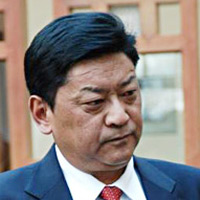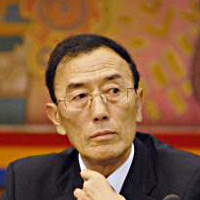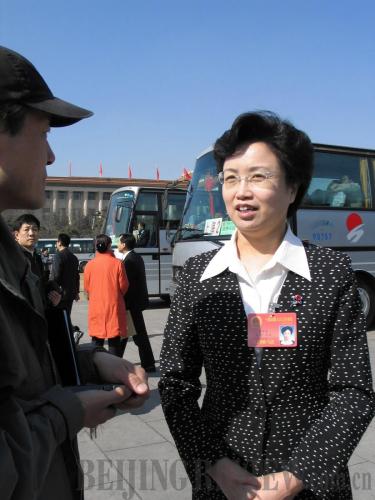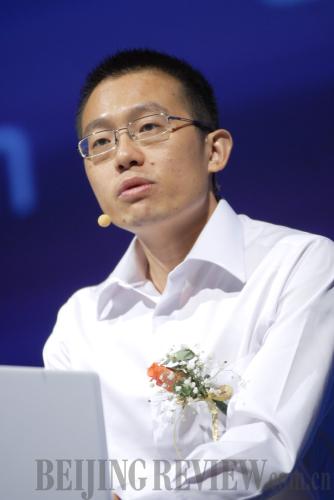| Tibet's New Leaders
 |
 |
|
Padma Choling (CNSPHOTO) |
Qiangba Puncog (WEI YAO) |
Padma Choling was elected chairman of the government of southwest China's Tibet Autonomous Region on January 15. His predecessor, Qiangba Puncog, was elected head of the Tibet Regional People's Congress, the local legislative body, on the same day, replacing Legqog who, at 66, has reached the mandatory retirement age.
Padma Choling, 59, is a native of Dengqen County in Tibet. After serving 17 years in the army from 1969 to 1986, he became an official in Tibet's regional government and was elected its vice chairman in 2003.
"In contrast to his predecessor, the slender, bespectacled and soft-spoken Qiangba Puncog, Padma Choling is firm and strong-willed," a Xinhua News Agency report quoted an anonymous source familiar with the two officials as saying.
Qiangba Puncog, born in 1947, began to serve as chairman of Tibet's regional government in 2003 and was reelected in 2008. A mechanics major graduating from Chongqing University in 1975, he was among the first Tibetans to receive a college education.
Speaker for Women
 |
|
Song Xiuyan (XINHUA) |
Song Xiuyan, once China's youngest provincial governor, has been elected first secretary of the secretariat and vice president of the All-China Women's Federation, a national organization to protect women's rights and interests.
Song, 55, had served as governor of northwestern Qinghai Province since 2005 and resigned from the post on January 12 of this year. She is the second female governor in China, following Gu Xiulian who was governor of eastern Jiangsu Province between 1983 and 1985.
A former railway worker, Song had worked for 27 years in Qinghai, which is located on the northeastern part of the Qinghai-Tibet Plateau with an average altitude of more than 4,000 meters. On January 22, 2005, she was elected governor of the province at the age of 49.
Outgoing Baidu CTO
 |
|
Li Yinan (WEI YAO) |
Li Yinan, chief technology officer of Baidu Inc., operator of the world's most used Chinese search engine, has resigned. The company confirmed Li's departure on January 19.
Li, 40, is to become CEO of a wireless service portal of China Mobile, the world's largest mobile carrier by subscriber numbers, said Shanghai-based China Business News.
A tech genius, Li began his career at Huawei Technologies Co. Ltd. in 1993 and became vice president of the largest networking and telecommunications equipment supplier in China at the age of 27. Between 2000 and 2006, he was CEO of self-founded Harbor Networks. After his firm was acquired by Huawei, he was named Huawei's chief telecommunications scientist and vice president.
Li joined Baidu in October 2008. During his tenure, he led the development of the company's next-generation search technology among other projects.
"This is about helping Haiti, not about occupying Haiti."
Alain Joyandet, French Minister of State for Cooperation and Francophony, protesting on January 16 after U.S. troops turned back a French aid flight to earthquake-ravaged Haiti
"China has taken expanding imports from African countries as the focus of its trade policy toward Africa."
Chen Deming, Chinese Minister of Commerce, during his visit to Tanzania
"I think with the active participation of China in promoting the new challenges in front of UNESCO, we can move forward with a very strong agenda."
Irina Bokova, Director General of the UN Educational, Scientific and Cultural Organization (UNESCO), recognizing China's efforts to preserve its cultural and natural heritage
"By shifting the hand back from midnight by only one additional minute, we emphasize how much needs to be accomplished."
Lawrence Krauss, co-Chair of the Bulletin of Atomic Scientists' board of sponsors, speaking at a January 14 ceremony to turn back the minute hand of the symbolic Doomsday clock, which was created in 1947 as a barometer of how close the world is to an apocalyptic end
"The restoration of our ecosystems must be seen as a sensible and cost-effective investment in this planet's economic survival and growth."
Hilary Benn, British Environment Secretary, calling for immediate global efforts to preserve the world's biodiversity that, he said, is deteriorating to a point of no return
"Previously, we viewed the large and high-profit-generating firms as good ones. The concept has changed now."
Liu Nanchang, an official with the State-owned Assets Supervision and Administration Commission of the State Council of China, on the country's planned use of investment efficiency-based new measures to assess the performances of large state-owned enterprises
"The notion that recreational cocaine use is 'safe' should be dispelled."
Joaquin Lucena, head of forensic pathology at the Institute of Legal Medicine in Spain, on a study that found that over 3 percent of sudden deaths in Europe are related to cocaine use | 